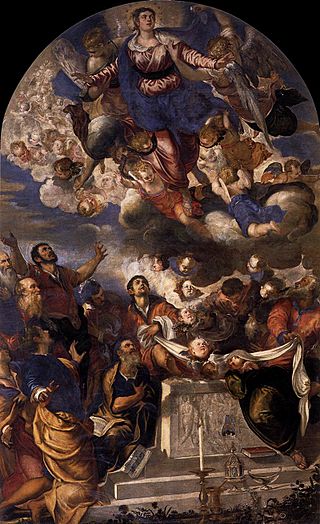Santa Maria, Sta. Maria or Santa María is a title of Mary, mother of Jesus, in languages such as Italian, Portuguese and Spanish.
Basilica of St. Mary may refer to:
Santissima Annunziata may refer to:
Santa Maria della Visitazione may be:
Santa Maria della Concezione is the name of several churches.
Santa Maria della Pietà may refer to:
Santa Maria della Misericordia may refer to:
Santa Maria della Neve, in English, Madonna of the Snow or Snows, is a title of Marian veneration for Mary, mother of Jesus
Santa Maria della Carità may refer to:
Sancta Maria refers to Saint Mary, mother of Jesus Christ.
Santa Maria della Catena may refer to:
Santa Maria della Vittoria is the name of several churches in Italy:

Assumption of the Virgin is a c.1555 oil on canvas painting by Tintoretto, now in the church I Gesuiti. It and Presentation at the Temple were both originally painted for the church of Santa Maria dei Crociferi. Its colouring is similar to that of Paolo Veronese and Carlo Ridolfi wrote of it that originally Veronese had gained the commission for it before Tintoretto took it from him by promising to produce the work in Veronese's style.

Presentation of the Virgin is an oil on canvas painting of the Presentation of Mary by Tintoretto, created c. 1551-1556, in the church of Madonna dell'Orto in Venice. Its diagonals aim to provide a stark contrast to Titian's 1534-1538 work of the same subject. Vasari's Lives of the Artists calls it "A finished work, and the best-made and most felicitous painting in that place".
The Presentation of the Virgin Altarpiece is a c. 1515-1517 oil on panel altarpiece by Palma Vecchio, now in the church of Santa Maria Annunziata in Serina, Lombardy, the painter's birthplace.
Santa Maria della Salute is a church in Venice, Italy.
Santa Maria della Stella may refer to:
Santa Maria della Pace is a church in Rome.
This page is based on this
Wikipedia article Text is available under the
CC BY-SA 4.0 license; additional terms may apply.
Images, videos and audio are available under their respective licenses.

